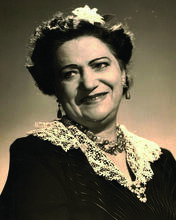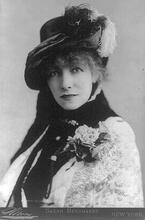Fania Marinoff
Actress and volunteer Fania Marinoff (1890 – 1971) in 1913.
Image courtesy of Wikimedia Commons.
Fania Marinoff may have been an actress of stage and screen, but she was best known as a hostess whose home became a major hub for artistic circles in New York. Orphaned at a young age, she showed promise as an actress and by age twelve she was earning a living on stage. In 1914 she married Carl Van Vechten, a writer and photographer, and the pair hosted parties and salons that included Gertrude Stein, Eugene O’Neill, Georgia O’Keeffe, and many luminaries of the Harlem Renaissance. Meanwhile, Marinoff’s career flourished as lead actress in the Greenwich Village Players from 1916 to1917. She also appeared in silent films such as One of Our Girls in 1914, Nedra in 1915, and Life’s Whirlpool in 1916.
Article
Fania Marinoff was associated with one of the most vibrant artistic circles in the United States and Europe. She numbered among her friends writers such as Gertrude Stein, playwrights such as Eugene O’Neill, and artists such as Georgia O’Keeffe. Fania Marinoff and her husband, Carl Van Vechten, played a prominent role in the bohemian social and artistic life of New York, particularly of the Harlem Renaissance.
Born, probably in 1890, in Odessa, Russia, Fania was the thirteenth child and seventh daughter born to Mayer and Leah Marinoff, who died not long after Fania was born. Mayer remarried and immigrated to America in the mid-1890s, when Fania was five or six years old, settling in Boston. At age seven, Fania was sent to live with her older brothers in Denver, Colorado. Although she had little formal schooling, she showed considerable promise as an actor, and by age twelve she was earning her living playing soubrette roles in repertory. Fania first arrived in New York in 1903, finding steady work in theater there. In 1912, she met Carl Van Vechten, the author and photographer, and the two were married in 1914.
Marinoff continued to act on the stage after her marriage, appearing as Ariel in the tercentenary revival of The Tempest in 1916, and as a lead in the Greenwich Village Players from 1916 to 1917. She was also a pioneer of the early silent film industry, appearing in One of Our Girls (1914), Nedra (1915), and Life’s Whirlpool (1916). In 1942, Marinoff became one of the early volunteers for the Stage-Door Canteen, a troupe established to entertain the armed forces. After the war, she retired from the stage, but remained active. She and her husband continued to entertain a large circle of friends in the arts until his death in 1964. Fania Marinoff died seven years later, on November 16, 1971, in Englewood, New Jersey.
While Fania Marinoff was not a practicing Jew, she was an intensely religious person and Judaism was central to her identity. In her early stage career, she was often cast in foreign roles, and occasionally in a Jewish role, and her immigrant background and experience living in working-class neighborhoods brought a sympathy and realism to these roles that impressed contemporary critics and theater audiences.
AJYB 24:179.
BEOAJ; “Fania Marinoff.” NYTimes, December 9, 1917, 8:7.
“Fania Marinoff, Actress, 81, Dead.” NYTimes, November 17, 1971, 51:1.
Kellner, Bruce. “Fania Marinoff.” In Carl Van Vechten and the Irreverent Decades (1968).
Kellner, Bruce, ed. Letters of Carl Van Vechten (1987).
“Minute Visits in the Wings.” NYTimes, September 22, 1918, 4:4.
“Who’s Who.” NYTimes, March 9, 1924, 8:2.
WWIAJ (1926, 1928, 1938).















